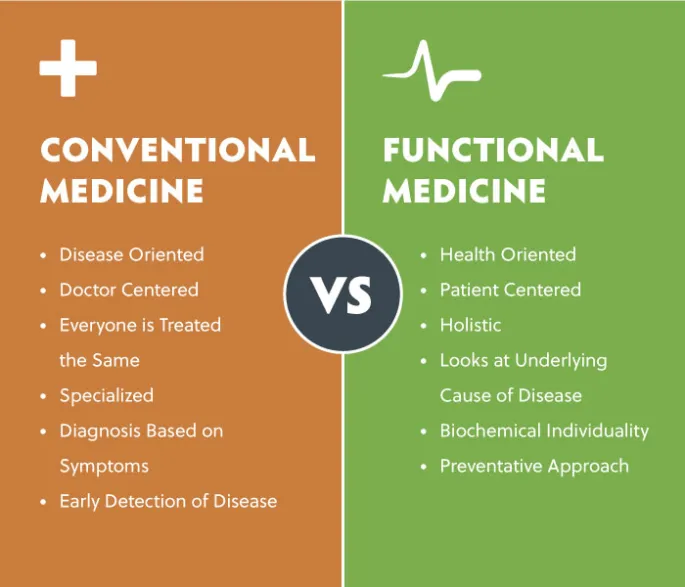
Functional medicine is an approach to healthcare that has received increasing attention over the years. This approach does not only focus on providing symptomatic relief, but seeks out the root causes of disease and addresses them. From this perspective, the body is not treated as the sum of several ‘specialties’ like most of the traditional medicine approaches but rather as a single unit in which different systems works within each other. However, what functional medicine has that sets it apart from other medicines, is there really a new approach to health? Let us find out here.
What is Functional Medicine?
Functional medicine is a person-specific, whole approach to bettering health through tracing the causes of an illness back to lifestyle, genetics, and environmental condition. It developed treatment based on the characteristics of each individual.
Practitioners utilize more diagnostic tests for the body to be able to identify the problems and offer solutions like diet, lifestyle changes, or supplements. The main goal is availing health and the best functioning of the body to the clients and instead of controlling symptoms alone
Is functional medicine the same as holistic medicine?
While functional medicine and holistic medicine both emphasize whole-body health, they differ in focus. Functional medicine targets underlying causes through science-based approaches, while holistic medicine prioritizes balance among physical, emotional, and spiritual aspects. Both aim to treat the individual rather than just symptoms.
It is in accomplishing the balance of the body, mind, and spirit that holistic medicine often integrates meditation and acupuncture therapies. Functional medicine applies a meticulous history of medical data and lab tests to understand the causes of an illness and then design precise interventions based on unique health profiles.

How is functional medicine related to alternative medicine?
Functional medicine incorporates aspects of alternative medicine, using therapies like acupuncture and herbal treatments alongside conventional methods. It focuses on personalized care by addressing root causes, whereas alternative medicine generally uses non-traditional treatments without integrating standard medical practices.
It tends to borrow a lot from alternative medicine practices, such as herbal remedies and nutritional supplements but places them in a scientific context. This practice strongly lays its basis on evidence-based treatment while utilizing alternative therapies that could be complementary to the traditional ones in driving toward a well-balanced and individual system of health targeting root causes.
What distinguishes functional medicine from conventional medicine?
Functional medicine differs from conventional medicine by emphasizing root cause analysis, personalized treatment, and lifestyle modifications. While conventional medicine often focuses on diagnosing and treating symptoms with medication or surgery, functional medicine seeks to understand how and why illness occurs.
Conventional medicine is generally focused on acute care and standardized treatments. Functional medicine, on the other hand, is proactive, looking at things like lifestyle, environment, and genetics as they relate to disease. It seeks to bring an optimum state of health by individually tailored plans that point to prevention and long-term wellness instead of just short-term relief.
Is functional medicine the same as naturopathic medicine?
Functional medicine and naturopathic medicine share a focus on natural remedies and holistic care but differ in methodology. Functional medicine integrates scientific evidence with holistic practices, while naturopathic medicine primarily relies on natural therapies and traditional healing methods to support the body’s healing process.
The primary orientation of naturopathic medicine is natural therapies, including herbal medicine and homeopathy, with lifestyle counseling and an emphasis on preventive care. Functional medicine is also preventive in nature but utilizes the power of modern science to create treatment plans tailored toward the individual’s root causes of disease and treating them effectively with natural and conventional modalities.

Can functional medicine be called preventive medicine?
Functional medicine can be considered preventive medicine because it aims to prevent diseases by identifying and addressing root causes. It focuses on lifestyle changes, nutrition, and early detection of imbalances, reducing the risk of chronic illnesses and promoting overall wellness.
Due to the efforts of functional medicine on understanding what actually triggers an illness, it is directed more towards the preventive approach. Hence, practitioners assess genetic, environmental, and lifestyle influences upon a client and design interventions that best promote health and thereby prevent illness. The application of interventions at the early phases of root causes enables functional medicine to avert a potential requirement for more invasive treatments.
How does integrative medicine differ from functional medicine?
Integrative medicine combines conventional and alternative therapies for comprehensive care, focusing on healing the whole person. Functional medicine, while similar, is more focused on understanding the underlying biochemical and physiological causes of disease to create personalized, targeted treatment plans.
By the use of conventional and alternative therapies like yoga and nutritional supplements, the practice of integrative medicine gives a more balanced approach to health. In contrast, functional medicine goes further to the biochemical process and genetic predisposition in order to individualize treatment approaches and make sure that the kind of approach prescribed for the patient is duly appropriate to the profile of his or her health condition.
The decision of whether or not functional medicine suits you can be just as complicated as its own system. It does not mean replacing conventional treatment with this one but instead finding out how they can be used together to address all your health needs more effectively. This fosters partnership between patient and doctor with wellness being viewed as more than mere absence of disease.
Wrapping Up!
Functional medicine represents not just another buzzword in healthcare but rather a significant departure towards an integrated, personalized approach to health. It doesn’t only ask “What is the problem?” but also “Why” and “What should we do about it?”. For those seeking deeper insights into their well-being, functional medicine provides a hopeful way forward where individuals are empowered to take charge of their health. As such, decisions must always involve competent professionals who will advise accordingly based on individual circumstances while considering one’s unique state of wellness before embarking on such a journey.

